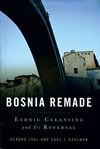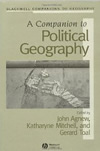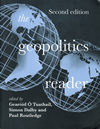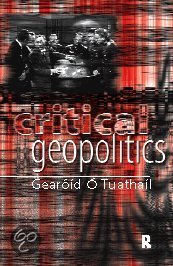Introducing Gerard Toal (Gearóid Ó Tuathail)
 Dr Gerard Toal is Professor of Government and International Affairs at Virginia Tech, National Capital Region (US). He studied History and Geography at the National University of Ireland, Maynooth, between 1979 and 1982. He then studied political geography with Dr John O’Loughlin at the University of Illinois between 1982 and 1984, minoring in Latin American and African Studies.
Dr Gerard Toal is Professor of Government and International Affairs at Virginia Tech, National Capital Region (US). He studied History and Geography at the National University of Ireland, Maynooth, between 1979 and 1982. He then studied political geography with Dr John O’Loughlin at the University of Illinois between 1982 and 1984, minoring in Latin American and African Studies.
Thereafter he studied, under the director of Professor John Agnew, in the Department of Geography at Syracuse University, defending a PhD entitled “Critical Geopolitics: The Social Construction of Place and Space in the Practice of Statecraft” on 7 December 1988.
 He writes about political geography and geopolitics at: Blog of Gerard Toal
He writes about political geography and geopolitics at: Blog of Gerard Toal
In this interview, Professor Toal elaborates among other things on his youth in Ireland, the state of geopolitics and possible scenarios for the future. The latter include a global crash or pandemic, a nuclear war and new cases of state failure.
Your relationship with geopolitics
At what age did you discover geopolitics and what attracted you to it?
This question has layers to it. First, I don’t think I discovered geopolitics so much as slowly realized that where I lived was not like other places in Ireland because we were so close to Northern Ireland. In driving there we were, weirdly, entering another world, another country.
 This question has layers to it. First, I don’t think I discovered geopolitics so much as slowly realized that where I lived was not like other places in Ireland because we were so close to Northern Ireland. In driving there we were, weirdly, entering another world, another country. Some might describe this as ‘political geography’ but where I lived, in an area where many people were strongly nationalistic, the border was perceived as a political construction. The term ‘geopolitics’ is, therefore, more appropriate. It was a geography made by politics, and that political order was under contestation (again) from the late sixties onwards.
This question has layers to it. First, I don’t think I discovered geopolitics so much as slowly realized that where I lived was not like other places in Ireland because we were so close to Northern Ireland. In driving there we were, weirdly, entering another world, another country. Some might describe this as ‘political geography’ but where I lived, in an area where many people were strongly nationalistic, the border was perceived as a political construction. The term ‘geopolitics’ is, therefore, more appropriate. It was a geography made by politics, and that political order was under contestation (again) from the late sixties onwards.
I was quite aware of this, but never fully recruited by nationalistic sentiments. My dad’s family were supporters of Fine Gael, the right of centre political party in the Republic of Ireland, and thus strongly critical of Sinn Fein. My grandfather on my mother’s side was in the ‘old IRA’ but not in politics or part of ‘causes’ at that time. I became friendly with a boy who visited each summer from Belfast. He was in the thick of riots there, and I, by contrast to him, was a provincial innocent.
My family owned a grocery shop, which my dad had bought from a Protestant family. We inherited many of that businesses Protestant customers who came daily for then newspapers The Belfast Telegraph, The Newsletter and weekly for The Impartial Reporter. Protestants and Catholics got along fine in our village, so far as I knew, but my father and mother never talked politics in the shop.
This became difficult as ‘the Troubles’ forced divisions, and oppositional identities, upon people. After Bloody Sunday in 1972, my friend brought new ‘toys’ from Northern Ireland: spent tear gas canisters, and rubber bullets. Those things were huge, and made an impression on me. So also did the local murder of Senator Billy Fox in March 1974, the Monaghan and Dublin bombings of 17 May 1974, and the Miami Showband killings the next year. I stood for years near the ruins of Monaghan bombsite waiting for my school bus home. The local border post was blown up and replaced by a militarized British Army outpost.
One of my classmates was ‘lifted’ in Northern Ireland for suspected involvement in the ‘provos’ (IRA). I remember having to play a Gaelic football match one weekend without his brother, a star player, because the journey to the game went through Northern Ireland and he didn’t want to risk it. The conflict was then unavoidable. After the death of Bobby Sands, 5 May 1981, my father was intimidated into closing our shop to mark the event. Black flags flew from the street lamps. It was a tense polarized time, and required sensitivity in the grocery shop. Some of our Protestant customers had lost family members in IRA attacks in Northern Ireland. I was in university by then, and thoroughly sick of the politics surrounding Northern Ireland.
The second layer, beyond Ireland, was stimulated by Time magazine, which someone in our extended family received. I remember getting a bunch of these, and encouraged to read them to better myself. I didn’t care for this but I recall the ‘arc of crisis’ cover and stuff about Kissinger and then Iran. That would have been 1979. The third layer was in university where there was activism among left of centre Catholic missionary priests, influenced by liberation theology, about US foreign policy in Central America. The first time I saw the US Embassy was attending a protest about US military aid to El Salvador. This was after the assassination of Archbishop Romero (24 March 1980).
I also became slightly involved in the nuclear disarmament movement within Ireland and remember going on a relatively small march in Dublin where Bono got up and sang ‘A Hard Rain’s Gonna Fall’ which Dylan wrote in response to the Cuban Missile Crisis. Disgust with Northern Ireland and passion about broader planetary issues drove me towards the study of geopolitics. My Irish university did not have a Politics, Political Science or International Relations program so ‘geopolitics’ was the pathway to study these issues through advanced study within Geography.
I knew what I wanted to do when I left Maynooth on 18th September 1982 for ‘the States’: geopolitics from a ‘radical geography’ perspective. I am grateful to the US for being open and welcoming to international students, including critics.
Which geopolitical topics have your focus and why did you choose especially these?
In writing a 2010 essay “Localizing Geopolitics” I found myself revisiting the subject of my BA thesis, which was on my home county of Monaghan during World War I, before there was a border. This began, for me, a lifelong interest in nationalist movements and how international events are experienced in local places. I begin with this because I’ve returned to these themes via the critical analysis of geopolitics.
Post-structuralist thinking helps reveal the politics of expert discourses, and, in the case of most forms of geopolitics, one of those political commitments is to national(ist) forms of identity. Critical geopolitics leads one to connect nationalist studies and international affairs. It also helps reveal the locals that are behind the globals, the parochial forms of globalism that one finds in many geopolitical discourses, and the smallness of the central sites of its production.
Dissatisfied with writing in a general way at the global scale, I decided to dive into the local with a research project on Bosnia conceived in 1999. I am continuing in this vein today with my current project on the Russian-Georgian August War of 2008, a project that involves a very small place shaped by and caught up in a global symbolic geopolitical struggle. It is allowing me to learn a lot about how my current hometown, Washington DC, works.
What do you consider your most important contribution to geopolitics?
I leave that for others to judge. I hope that my most important contributions are to come!
I certainly have plans for various publications to pull the various things I’ve been working on together. Let’s see if I can in the next few years.
Your geopolitical preferences
What is your favourite definition of geopolitics?
 Rich Schein, now a Professor of Geography at the University of Kentucky, used to rib me when we were in graduate school at Syracuse University by asking: “have you come up with that definition of geopolitics yet?” I remember struggling to understand how one could and should define geopolitics. After a while I realized that it was a trick question, the “what is..?” that demands an essentialism.
Rich Schein, now a Professor of Geography at the University of Kentucky, used to rib me when we were in graduate school at Syracuse University by asking: “have you come up with that definition of geopolitics yet?” I remember struggling to understand how one could and should define geopolitics. After a while I realized that it was a trick question, the “what is..?” that demands an essentialism.
Thereafter, I’ve seen geopolitics as a problematique of writing on geography and politics, with fascinating historical dimensions and multiple contemporary aspects. For some time I’ve broken it down for my students into 4 separable (but not separated) traditions of thinking, each of which is still with us:
- Discourse on the influence of ‘nature’ on politics. This discourse has generated ‘natural binaries’ – landpower vrs seapower, East vrs West, etc – that are put to work in many different contexts. Historically this discourse has tended to have a prevailing conceit of the revelation of timeless truths.
- Social Darwinism on the map. A second vector is discourse is about population and the environment, an emergent theme from mid-eighteenth century onwards that reached ‘scientific’ expression with the development of ‘social Darwinism’ (not Darwinian at all, of course, but neo-Lamarckism). Nazism was the most infamous expression of this, of course, but it was widespread in the thinking of major powers from the late nineteenth century onwards.
- Realpolitik on the map. The dominant understanding in Political Science and International Relations, this found full expression during the Cold War in the writing and practical geopolitics of Henry Kissinger. It too has social Darwinist prejudices.
- Critical Geopolitics. I would use this term to describe any work that challenged the prevailing geopolitical assumptions and practices of the major powers.
But, as I write this, I find it unsatisfactory in certain ways. I think I’ll have to work on this some more, and find a great zinger for Rich Schein.
Which geopolitical scientist do you admire the most?
Ah so it’s a science! Well, looking at the folks in white coats I’d have to pick out Dr Jekyll over there next to the smouldering beaker.
Obviously, my academic advisers have been a major influence in my thinking and career. I deeply admire Dr John O’Loughlin and Dr John Agnew, two very different academics but equally generous advisers and splendid human beings. Tim Luke is equally great in my estimation.
Beyond them, I greatly admire the work of Simon Dalby, David Campbell, Gerry Kearns, John Pickles, Derek Gregory and, of course, Neil Smith, who is much on my mind these days because of his tragic death. Richard Ashley and David Sylvan in Political Science were very influential on my thinking while in graduate school.
There are other somewhat younger political geographers whom I admire also and learn from: Matt Sparke, Stuart Elden, Mat Colemen, Anna Secor, and others. Naming just these folks, however, is unfair to the many others who do great work that I also admire: Klaus Dodds, James Sidaway, Marcus Power, Jo Sharp, Paul Routledge, etc.
I have generally found Geography to be a supportive disciplinary environment and culture. So, in that sense, I admire the culture that we’ve created around critical endeavour in the field.
What is your favourite geopolitical book?
I don’t really have a favourite book that endures. Let me answer a different question: what books would you recommend to young scholars seeking to grasp Critical Geopolitics 1.0?
Here I’d want to take younger scholars through the significant publications of the early nineties beyond influential books like Said’s “Orientalism” and Todorov’s “The Conquest of America”. Here I’d cite:
- Simon Dalby’s “Creating the Second Cold War” (1990),
- David Campbell’s “Writing Security” (1992),
- Rob Walker’s “Inside/Outside” (1992),
- Agnew and Corbridge’s “Mastering Space” (1995).
What is your favourite geopolitical website?
The geopolitical future
In what direction(s) will geopolitical science be heading the coming decades?
In the direction of the Enlightenment, I hope.
Which geopolitical subject has been too little in the spotlight and needs further research?
If we understand ‘the spotlight’ here to refer to issues on the political agenda of major powers, then clearly it is climate change. There has been next to no discussion of the topic in the US Presidential election, for example. The reasons are obvious but the failure is obvious too as we live through dramatic changes in the planetary weather system, and global ecological environment.
Nuclear proliferation issues do get attention but there is evidence that these deserve a great deal more attention as we could be on the verge of a ‘breakout’ of the current nuclear order. The vulnerability of the current interconnected global financial system to a major crash is also something that needs a lot more attention than it is getting. The capitalist system has a lot of dark corners, and hidden regions.
What will be the largest geopolitical challenge for the world in the 21st century?
 There are many. The first is the danger of a systematic crash brought on by global fiscal imbalances. Current patterns are unsustainable. China cannot continue as the growth engine of the world economy, the US with deficit financed over-consumption, and the European Union with imbalanced national economies joined by the Euro. Something has to give, and the crash could be nasty.
There are many. The first is the danger of a systematic crash brought on by global fiscal imbalances. Current patterns are unsustainable. China cannot continue as the growth engine of the world economy, the US with deficit financed over-consumption, and the European Union with imbalanced national economies joined by the Euro. Something has to give, and the crash could be nasty.
The second is containing the possibility of a major inter-state war involving nuclear weapons. The recent riots against Japanese sites and symbols in China were ugly. This is probably inevitable before the end of the century – the empirical record of the twentieth century and before is not encouraging – and its literal fallout will be frightening. Reading John Dower’s superb “Cultures of War: Pearl Harbor/Hiroshima/9-11/Iraq” makes one very pessimistic about the human condition.
The third is a global pandemic of some sort. The state of the world’s health infrastructure is a cause for concern. Work in creating robust and resilient systems has occurred but there has insufficient investment in improving world health conditions and capacities in my opinion. This failure is providing deadly for millions at the bottom and could prove very costly for many more mid-century.
The fourth is dealing with civil wars and state failures. The situation in Syria is an indictment of the current international order, especially the current feeble United Nations permitted by the major powers, with no capacity for global protection forces to safeguard civilians. These issues are deeply complex but they are not beyond our capacity to address them.
In these conditions, Gramsci’s mantra is still appropriate: “Pessimism of the intellect. Optimism of the will.”
